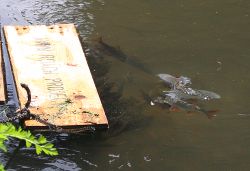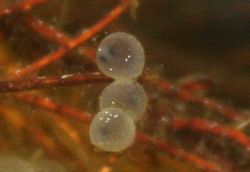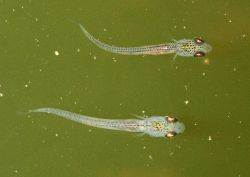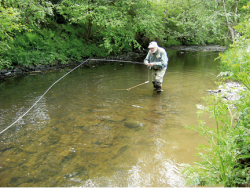Environment Agency - 2009 RFERAC Cornwall Fisheries Report
Environment Agency - 2009 RFERAC Cornwall Fisheries Report
Enforcement
We've had a number of high profile enforcement
successes, several of which have led to
widespread media coverage. In June, a
Wadebridge man was found guilty of the illegal
capture of a salmon from the River Camel. A
fishmonger was also found guilty of the illegal
purchase and sale of the same fish.
In July, three men were found guilty of setting
illegal gill nets between Rock and Polzeath. In
August, a Padstow man was found guilty of setting
an illegal net in the estuary near Little Petherick.
Three illegal nets have been seized and destroyed
from Plymouth Sound, Polhawn and Millendreath.
Monitoring
Data from the River Tamar trap and fish counter
suggest that, although there have been
reasonable numbers of multi-sea winter salmon
returning, grilse numbers have been unusually
low.
Angling participation events
We have had another great year with seven junior
events, five adult events and a hugely successful
family day. In total, we’ve coached around 300
people. Alongside the routine angling
participation events, we also ran some
collaborative projects that increase angling
participation and also improve access to fisheries.
Projects
Kerrier Pupil Referral Unit
This project was a collaboration with SW Lakes
Trust who gave us free use of Stithians. We were
able to run five days for pupils from the school.
This enabled 80 students a chance to try a days
fishing.
Cornwall Blind Association
We have funded this charity to enable them to run
six introduction days for five people. A lower ratio
of students to teachers was obviously required
but, even so, 30 people have been given the
chance to try fishing. This did prove a challenge to
our coaches Bob and Jerry, one that they
wholeheartedly embraced and the feedback has
been excellent. We hope to continue to work with
them.
Echo Physical Disability Centre
With a free venue provided by SW Lakes Trust, we
were able to run five days of fishing using the
wheelyboat at Siblyback, coaching 45 people.
Bere Alston & 29th Plymouth Scout Groups
Our contribution to these groups enabled them
each to run five days of fishing for 160 people. The
scouts were tremendously well organised and the
days ran like clockwork.
South West Prisons Angling Association
We have recently made contact with this new club
and are planning to fund them in the near future.
Club Brunel
Access to Sillaton Lakes for the less able members
will be improved by stabilising the access paths
using better surface drainage. Also, improvements
will be carried out to the fishing pegs to enable
people of all abilities to fish.
Whalesborough Fish Pass Project (Stat and Neet)
An Alaskan A fish pass has been installed at
Whalesborough. The project was funded by
Environment Agency regional money and by North
Cornwall District Council. The fish pass will enable
sea trout and eels to gain access to over 25km of
the Rivers Neet and Strat. These rivers are
currently classed as 'Poor' for fish populations
under the Water Framework Directive. This is great
news, as Whalesborough weir has been a barrier
to sea trout and eels for years.
Sky Tips erosion control
We now have agreement with the landowner to
trial straw bales to prevent sand run off from old
china clay tips into the River Warleggan.
7% of the salmon caught in the trap have had ‘red
vent’ syndrome, a condition linked to a parasitic
worm Anisakis sp. The condition causes necrosis
of the flesh around the vent which opens the fish
up to secondary bacterial infections and may
potentially affect spawning success.
The fish counter and trap at Gunnislake also
recorded large numbers of sea lamprey
(Petromyzon marinus) returning to spawn in 2009
with more than 300 counted between April and
August. As well as recording biological
information, fin clips were taken from some of the
sea lamprey as part of a genetic study. The study
is investigating the genetic distinctness of
European sea lamprey populations to see if each
country, region or river has its own genetically
distinct population. This would have important
implications for their conservation and
management.
Fish runs on the Fowey have shown a 13%
decrease in salmon/large sea trout numbers and a
48% increase in sea trout numbers compared to
this time last year.
Trophy Partnership
(Torpoint Rame Outdoor Pastimes & Hobbies for
Youth)
This project seeks to involve young people in
outdoor pursuits in an effort to divert them from
anti social behaviour. We were delighted to work
with Police Community Support Officer John
Riggall and coach Bob Tetley to sponsor two days
of fishing. The uptake was great and saw 30
people receiving coaching.
The Zone - Youth Enquiry Service
Working with the Plymouth based youth group, we
enabled 80 children to sample coarse fishing over
five days.
Combebow Fish Pass (Tamar catchment)
A tributary of the River Lew is affected by a pipe
bridge as the pipes are too small to allow easy
migration of fish through them. Access to
significant salmon and sea-trout spawning
upstream will be improved. We will be replacing
three smaller pipes with a large culvert. The
culvert has been ordered and installation is
expected to start in the next few weeks.
Trenant Stream Gravel work (Fowey catchment)
The Fowey River Association are key partners in a
project with SWW funding to improve spawning
gravels in the Trenant Stream near Park Pit. The
work will start in the next few weeks.
Tamar gravel work
The cleaning and creation of 14 gravel spawning
areas has been completed at Tetcott and Luffincott
on the River Tamar using the gravel cleaning
bucket. The cleaning of natural gravels is
considered better than importing stone, a method
previously used.
Piall restoration (River Yealm)
Agreement has been reached with Imerys over the
works to be carried out including: reinstatement of
250m of natural channel, creation of in-stream
habitat to improve biodiversity and fish passage
improvements. The work will be carried out this
Autumn.
Hill Bridge, River Tavy - fish screen and fish pass
Work is now complete on this large environmental
improvement project, including the placing of
boulders for a secondary migration route in high
flows. A new fish pass and intake screens have
been installed by South West Hydro to make their
hydrogeneration stations more sustainable.
Evans Weir
Interim improvements have been made to the
existing fish pass where timbers had been lost
and leaks had made the pool fish pass
impassable in most flows. We have secured Defra
funding for design work for a new Larinier fish
pass, hopefully to be installed next summer.
Cotehele (Tamar Catchment)
Through negotiation with the National Trust we
have secured agreement for significant
improvement of the Cotehele fish pass on the
Morden Stream.
Knotweed control (River Tavy)
Roger Round from Tavy Walkham and Plym Fishing
Club is again tackling knotweed on the Tavy with
the assistance of Environment Agency funding and
landowners.
Salmon Tributary Project (Tamar, Tavy, Lynher,
Yealm, Plym)
Over 6,112 metres of fencing has been installed
with more lined up to do (2,900 metres). This has
been done in partnership with local farmers in
order to protect the riverbanks from erosion and to
encourage riparian growth.







